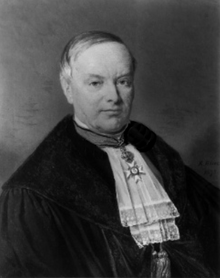Carl Heinrich Weizsäcker


Carl Heinrich Weizsäcker , von Weizsäcker since 1861 , (born December 11, 1822 in Öhringen , † August 13, 1899 in Tübingen ) was a Protestant theologian and representative of liberal theology .
life and work
Carl Heinrich Weizsäcker studied Protestant theology at the University of Tübingen . He was initially court chaplain at the court of King Wilhelm I of Württemberg . From 1861 he became a professor for church and dogma history at the University of Tübingen and took over the chair of his teacher Ferdinand Christian Baur . In 1890 Weizsäcker became chancellor of his university and remained so until his death. By virtue of his office as Chancellor of the University of Tübingen, he was a member of the second chamber of the Württemberg state parliament from 1890 to 1899 .
Weizsäcker was a leading representative of the historical-critical school . In his work, Investigations into Protestant History , Weizsäcker tried to reconcile liberal positions with Baur's position. With reference to the two-source theory and the Gospel of John , the authorship of which he declared to be apostolic, he tried to give historical reasons for statements about the person of Jesus . In his main work, The Apostolic Age of the Christian Church , he again oriented himself towards Baur. In 1840 he became a member of the Roigel Royal Society of Tübingen .
family
Carl Heinrich Weizsäcker comes from the Palatinate - Württemberg family Weizsäcker . He was the son of Sophie Weizsäcker, who was widowed at an early age. Rößle (1796–1864), who married Christian Ludwig Friedrich Weizsäcker (1785–1831) in 1816. He was pastor and preacher in the Hohenlohe royal seat of Öhringen and came from the second marriage of the princely mouth cook Gottlieb Jacob Weizsäcker . His brother was the historian Julius Weizsäcker (1828–1889).
Weizsäcker was married to Auguste Sophie Dahm (1824-1884) since 1848. The two had three children:
- Sophie (* 1850; † after 1910) ⚭ 1875 Adolf von Bilfinger (1846–1902), court preacher, three sons
- Karl von Weizsäcker (1853–1926), Württemberg politician
- Marie (1857–1939) ⚭ 1875 Paul von Bruns (1846–1916), surgeon, professor of medicine, two sons
Honors
- 1861: Award of the Knight's Cross of the Order of the Württemberg Crown , with which the personal nobility was connected
- 1862: Honorary doctorate (Dr. theol. Hc) from the University of Tübingen
- 1877: Award of the commentary cross of the Order of the Württemberg Crown
- 1894: Awarded the title and rank of Council of State
- 1897: Awarded the title and rank of a Privy Councilor
- 1897: Two honorary doctorates (Dr. phil. Hc and Dr. jur. Hc) from the University of Tübingen
Fonts (selection)
- Investigations into evangelical history, its sources and the course of its development . Besser, Gotha 1864 ( digitized version ); 2nd edition, Mohr (Siebeck), Tübingen and Leipzig 1901 ( digitized in the Google book search).
- Teacher and lessons at the Protestant theological faculty of the University of Tübingen. From the Reformation to the present . Fues, Tübingen 1877 (for the fourth secular celebration of the University of Tübingen in the summer of 1877: festival program of the Protestant-theological faculty) ( digitized version ).
- The Apostolic Age of the Christian Church. 3rd edition, JCB Mohr (Paul Siebeck), Tübingen and Leipzig 1902.
- Collaboration on the text Bible (translation of the New Testament)
literature
- Ad. Jülicher : Weizsäcker, Karl . In: Allgemeine Deutsche Biographie (ADB). Volume 55, Duncker & Humblot, Leipzig 1910, pp. 27-38.
- Frank Raberg : Biographical handbook of the Württemberg state parliament members 1815-1933 . On behalf of the Commission for Historical Regional Studies in Baden-Württemberg. Kohlhammer, Stuttgart 2001, ISBN 3-17-016604-2 , p. 1002 .
- Martin Wein: The Weizsäcker. History of a German family . DVA, Stuttgart 1988, ISBN 3-421-06389-3 .
- Wolfgang Schöllkopf: Crossroads. Karl Heinrich von Weizsäcker (1822–1890) and the Tübingen monastery. Traces from the life and work of the liberal theologian. In: Blätter für Württembergische Kirchengeschichte 88 (1988), pp. 428–445.
- Helge Dvorak: Biographical Lexicon of the German Burschenschaft. Volume I: Politicians. Volume 6: T-Z. Winter, Heidelberg 2005, ISBN 3-8253-5063-0 , pp. 249-251.
- Alf Christophersen: Weizsäcker, Carl Heinrich . In: Religion Past and Present (RGG). 4th edition. Volume 8, Mohr-Siebeck, Tübingen 2005, Sp. 1383.
- Ulrich Köpf : Carl Weizsäcker as a theologian. In: Norbert Haag (ed.): Tradition and progress. Wuerttemberg church history in transition. Festschrift for Hermann Ehmer on the occasion of his 65th birthday (= sources and research on Württemberg church history, vol. 20). Epfendorf, 2008, pp. 269-287.
- Klaus-Gunther Wesseling : Weizsäcker, Carl Heinrich von. In: Biographisch-Bibliographisches Kirchenlexikon (BBKL). Volume 13, Bautz, Herzberg 1998, ISBN 3-88309-072-7 , Sp. 706-710.
Web links
- Literature by and about Carl Heinrich Weizsäcker in the catalog of the German National Library
- Works by and about Carl Heinrich Weizsäcker in the German Digital Library
- Carl Weizsäcker's New Testament as an online resource
Individual evidence
- ^ A b H. O. Metzger: Weizsäcker, Karl Heinrich . In: Galling, Kurt (ed.): Religion in history and present . 3. Edition. tape 6 . Mohr, Tübingen 1962, p. 1594 .
| personal data | |
|---|---|
| SURNAME | Weizsäcker, Carl Heinrich |
| ALTERNATIVE NAMES | Weizsäcker, Carl Heinrich von |
| BRIEF DESCRIPTION | Protestant theologian |
| DATE OF BIRTH | December 11, 1822 |
| PLACE OF BIRTH | Öhringen |
| DATE OF DEATH | August 13, 1899 |
| Place of death | Tübingen |
